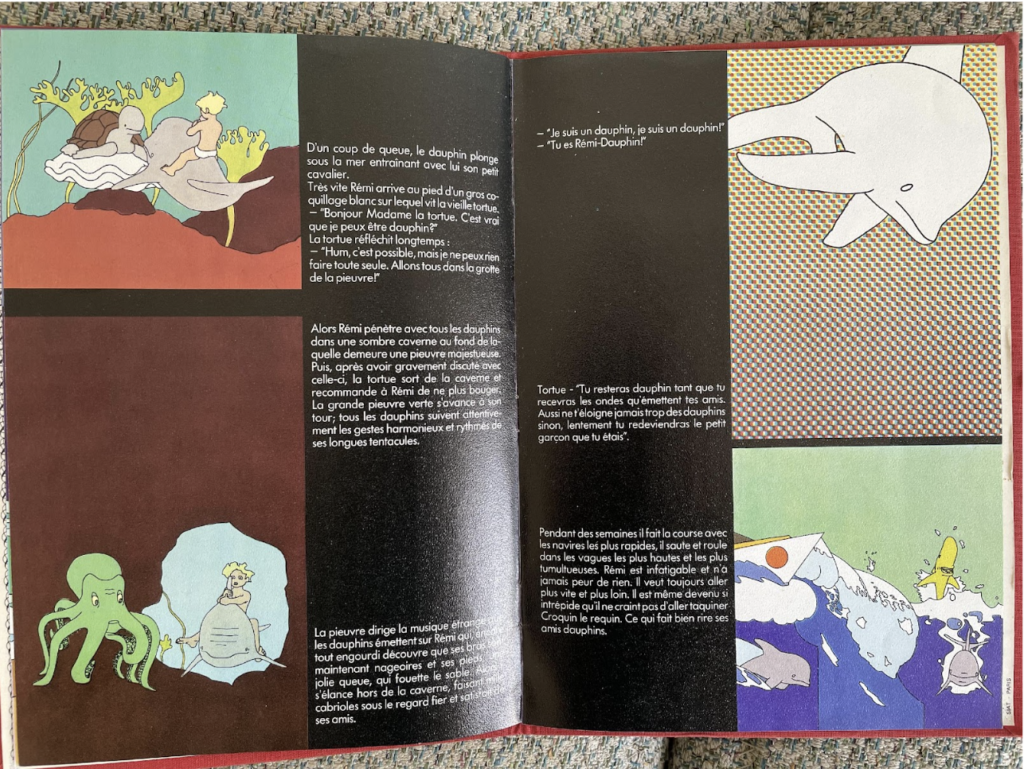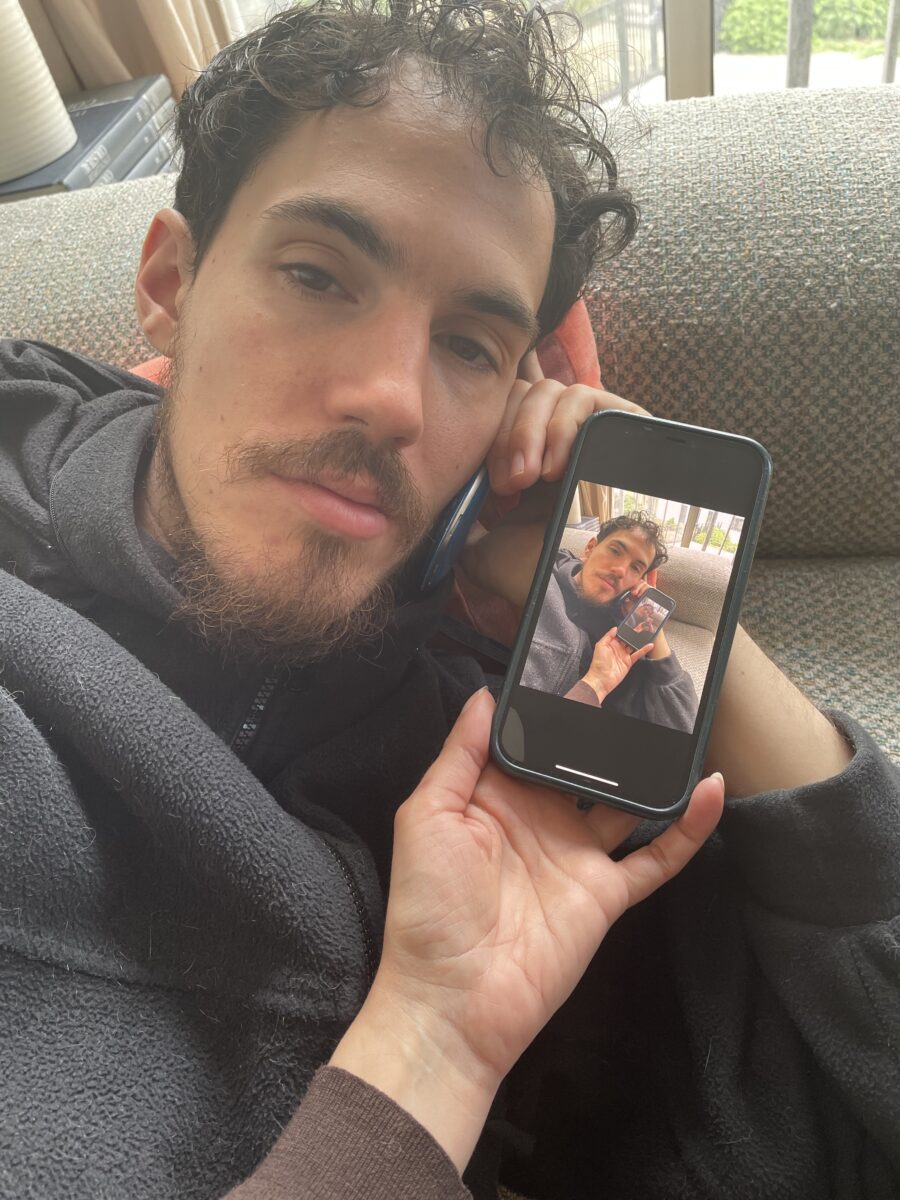Welcome to our Book Club series. Reading has always been a part of my life, for as long as I can remember, and I’ve always had a curiosity into what other people were reading, often questioning my family members about the books they had on their shelves or at the pool. Over the last few years, I’ve reconnected with that joy and it has become a constant with my friends, sharing our recent favourite reads, what we’ve taken away from them and what we are excited about exploring next. Bringing those conversations to 909, our Book Club series will delve deeper into other creative’s reading history from what they enjoyed when they were growing up, their most impactful read, quotes and more. In order to extend this community of readers, there is a bonus question for those who answer where they recommend a book(s) to next person who contributes to the club.
We’re super excited to welcome Nantes-based artist Simo Cell to the Book Club series. Someone who excels at world building and creating immersive narratives throughout his productions and DJ sets, we wanted to find out about the books that have maybe influenced some of these stories.
Late last year, Simo released his debut album ‘Cuspide Des Sirènes’ on his own TEMƎT label. Through the album, Simo tells the story of a protagonist who embarks on a quest to find a mystical lake, encountering magic, danger and self-realisation along the way. Accompanied by a fully playable Game Boy cartridge with different levels soundtracked by a special 8-bit versions of the album tracks, it’s an album that really stopped me in my tracks the first time I listened to it. A beautiful and emotional cinematic universe that continues to evolve and unfold over time with every listen. A release that truly showcased the potential of Simo’s artistry in creating universes – something he has been doing since he was a kid. There’s a sense playfulness and curiosity that also runs through some of his more club-oriented EPs such as YES.DJ (also released on TEMƎT with a zine) as well as releases on The Trilogy Tapes, Livity Sound, Wisdom Teeth and Brothers from Different Mothers. Then there’s his DJ sets and mixes which often leaves you questioning what a mix is supposed to sound like and the shape that they form. Take his recent of Climate Of Fear set where most of the tracks were taken to a lower tempo to match the sauna-like environment of the room or his RA mix which takes on a more collage approach as Simo shapes the session around the theme of ‘funky’, blending music from different eras to capture a sense of groove and warmth.
In this edition of Book Club, Simo talks through why he collects children’s books, his deep dives into our relationship as humans with living beings, and how reading allows him to discover the world in new ways.
Your favourite childhood book?
My favorite book was called “How to Live 7 Lives Without Hurting Your Feet » by Evelyne-Brisou-Pellen. It’s the story of a café boy who dies because of a pair of shoes. You can’t imagine a more foolish way to die, right?
By the way, I have a big collection of children’s books. I collect them for their stories but also for their visuals, which can be quite psychedelic at times. Despite their apparent simplicity, children’s stories are often very profound and offer a poetic perspective on life. There are always unique and quirky ways to explain life, much like mythology with Greek gods teaching us about life. Visually, children’s books offer endless possibilities—I have some from the 1970s that are absolutely stunning.

Most impactful/influential book you’ve read?
Lately, I’ve been reading a lot about our relationship (as humans) with living beings. It’s a political issue that deeply resonates with me.
The adventure novel, Memories from the Jungle by Tristan Garcia completely shook me. The story is told through the eyes of a chimpanzee who learned to speak and was raised by a family of ethologists. The book explores nature, culture, morality, and ethics through the journey of Doogie, a chimpanzee torn between his instinct and his education.
For those interested in the topic, philosophical essays like The Life of Plants: A Metaphysics of Mixture by Emanuele Coccia and Ways of Being Alive by Baptiste Morizot have radically changed my perception of life too.
A quote that has stuck with you?
It comes from Wolf Of The Steppes by Herman Hesse. This is more of a passage than a quote actually. It deals with topics that really affects me in music. I don’t really relate to the intellectualization of music, so I really fuck with what Pablo says at the beginning. However, both protagonists have interesting points of view that cover real existential questions for me.
« Do you see, it makes absolutely no sense to me to talk about music. I never discuss the subject. Besides, how could I have responded to your very intelligent and accurate remarks? You were so right about everything. I am a musician, not a scholar. However, I do not think that being right has any value in music; what matters in this field is not being right, having taste, culture, and all the rest.
-Certainly, I agree. But then, what does matter?
-It is to make music, Mr. Haller; as well, as often, and as intensely as possible! That is what matters, sir. Knowing all the works of Bach and Haydn by heart and being able to make highly relevant remarks about them benefits no one. On the other hand, if I take my instrument and play a wild shimmy, it will bring joy to people, whether the shimmy is good or bad. They will feel it in their legs and in their blood. That is the only thing that matters. Observe the faces one day, in a dance hall, at the moment when the music resumes after a long pause. Look at how their eyes sparkle, their legs twitch, their faces begin to smile! That is why we make music.
-Perfect, Mr. Pablo. But there is not only sensual music; there is also spiritual music. There is not only the music played in the present moment; there is also eternal music, which continues to resonate even when no one is playing it. Someone can be lying alone in bed, recalling in their thoughts a melody from The Magic Flute or The St. Matthew Passion. The music then exists without anyone blowing into a flute or drawing a bow across the strings of a violin.
-Certainly, Mr. Haller, but every night, many lonely and dreamy people also silently recall Yearning and Valencia. Even the poorest typist working in her office has the latest one-step in mind and types to the rhythm of that music. All these lonely beings are right. I am delighted that they carry this silent music within them; whether it is Yearning, The Magic Flute, or Valencia. But where do these solitary, mute melodies come from? They find them with us, the musicians. They must first be played and heard; they must be in the blood to be thought of and dreamed about in one’s room.
-I agree, I said coldly, however, it is incongruous to equate Mozart with the latest foxtrot. Moreover, it is not the same to play divine, eternal music before people or ephemeral, poor-quality music. »
As soon as Pablo detected irritation in my voice, he hastened to adopt a kind expression, gently caressed my arm, and began to speak with incredible softness.
« – Ah, dear sir; it is true, you may be right to evoke the existence of a hierarchy. I certainly do not oppose you placing Mozart, Haydn, and Valencia at levels that suit you! It makes no difference to me. I do not have to establish these different levels; that is something I am not asked to do. Mozart may still be played in a hundred years, whereas Valencia probably won’t be in two years. I believe that, in this area, we can quietly leave it to the good Lord. He is just, and he decides the duration of all existences, even that of each waltz and each foxtrot. He will surely do what is necessary. We musicians, however, must make our contribution, fulfill what represents our duty and mission: we must play what people want to hear at the moment and interpret it with as much talent, brilliance, and persuasive power as possible. »
I gave up the argument with a sigh. There was no way to get through to this man.
Favourite writer?
I don’t have a favorite at the moment, but looking back at my collection, the authors I’ve read the most are Romain Gary, Fyodor Dostoevsky, John Steinbeck and Alain Damasio.
Favourite genre?
Now, it’s definitely novels, mostly fiction. I love the psychology side of it. What I seek in reading is to immerse myself in the mind of a character, to become familiar with their way of thinking. When I read, the protagonist begins to become a part of me and accompanies me in life, it’s really intimate. I love this because it allows me to think differently, to adopt some of their behaviors and reflections, and to discover the world in new ways. Through their characters, authors embody aspects of themselves in us. We take what resonates with us from each character and it enriches us as individuals. Certain personality traits remain with us forever, making us more profound.
A book that you recommend everyone should read in their lifetime?
The Roots of Heaven from Romain Gary.
Considered a classic of French literature, this book is brimming with humanity. Published in 1956, it already raised questions about our relationship with nature and our treatment of living beings! The story follows Morel, dedicated to protecting the great mammals like elephants. Set in colonial Africa under French rule, Romain Gary explores the dynamics between various political forces, offering insights into the France-Africa relationship. The novel also explores the idea of fighting for ideals and pursuing one’s convictions to the end. It’s a story about courage and utopia. As the quote goes: “I don’t need an army,” he said. “Ideas don’t need troops: they make their own way.”
Your favourite setting to read in?
In festival backstages ![]() . Not quite hehe. I’m actually a summer park and train reader.
. Not quite hehe. I’m actually a summer park and train reader.
Are you someone who shares books with friends? If so, which book have you shared recently?
Sure! However, sharing a booking isn’t really a thing because books usually don’t come back; it’s more about giving a book 🙂 I gave “Dune” and “Foundation” by Isaac Asimov to a friend as an introduction to sci-fi.
What are you currently reading?
I just finished reading “Slowness” by Milan Kundera and I’m about to start “The Wisdom of Donkeys” by Andy Merrifield. Brian Dj Python recommended it to me. We always share recommendations. He would be a great person to interview.
“Slowness” is an interesting book that explores the idea that the degree of speed is directly proportional to the intensity of forgetting. The book intertwines different stories with characters who have varied perceptions of time… I’ll say no more. This resonates with me in relation to the constant pace of events. The year 2023 was probably one of my busiest in terms of events, all extremely positive, but when I think about it, few things come back to me. I see more of a large gray cloud of stress and haste, and I need to take the time to zoom in and make a real effort to immerse myself in the events of this year. What matters most is how we perceive what we experience – what’s the point if everything is forgotten by the following year?
